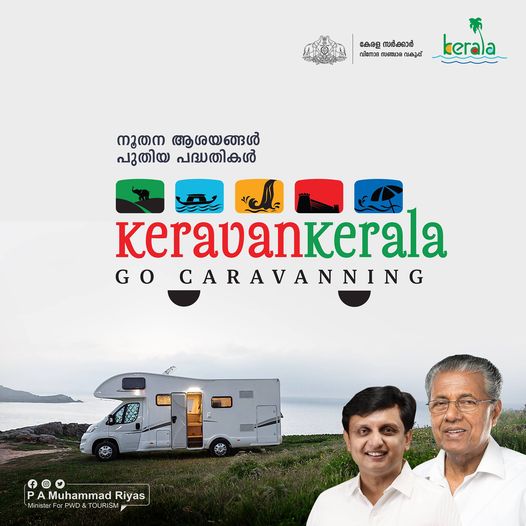Kerala announces comprehensive Caravan Tourism policy
 Rising to the demands and preferences of tourists in the post-pandemic world, Kerala on Thursday announced a comprehensive, stakeholder-friendly Caravan Tourism Policy, promising the visitors safe, customized and closest-to-nature travel experience.
Rising to the demands and preferences of tourists in the post-pandemic world, Kerala on Thursday announced a comprehensive, stakeholder-friendly Caravan Tourism Policy, promising the visitors safe, customized and closest-to-nature travel experience.
This marks a paradigm shift in almost three decades after the state made it big with houseboat tourism that provided a unique experience to visitors and positioned the state as a major global destination, Tourism Minister P A Mohamed Riyas said while unveiling the policy, which offers attractive investment subsidies to Caravan operators.
Like other successful tourism products of Kerala launched since the 1990s, Caravan Tourism is also to be developed on PPP mode with private investors, tour operators and local communities being key stakeholders, Riyas said at a press conference here.
He said investment subsidy would be given to Caravan operators, the details of which would be announced soon.
The policy envisages laying down the broad framework for the development and encouragement of Caravan Tourism in Kerala, predominantly in the private sector through incentivizing the purchase of caravans and for establishing caravan parks, chalking out the process and procedures for its operations and approvals , the Minister added.
On the occasion, Riyas also unveiled the logo of Caravan Tourism. The project will be rolled out in the next few months.
Caravan Tourism imparts an added thrust to the state’s inclusive approach of leveraging the tourism potential of the entire state by bringing to attention many unexplored spots side-by-side the promotion of established destinations. Every unexplored destination can be made accessible with the roll out of this meticulously drawn up policy, said Venu V, Additional Chief Secretary of Tourism.
The two major components of this activity are Tourism Caravans and Caravan Parks. While the first involves specially-built vehicles for travel, leisure and stay, the Caravan Parks are designated places to park the vehicles and enable the visitors to spend a night or a day or station for an extended period to explore the destination.
Caravan Tourism will also promote Responsible Tourism activities for sustainable growth and for the benefit of the local communities, promote eco-friendly practices and market for local products.
Going by Kerala’s inherent strengths of natural beauty and tourism friendly-culture, Caravan Tourism has immense scope for the state. Besides offering a refreshing experience for the tourists, local communities stand to gain substantially by enabling them to showcase their culture and products before the visitors , said V R Krishna Teja, Director, Tourism.
There will be two types of caravans. In one model, two guests shall be accommodated, while the other is for a family of four members.
The tourism caravans will have all the necessary facilities for a comfortable stay such as sofa-cum-bed, kitchenette with fridge and microwave oven, dining table, toilet cubicle, partition behind the driver, Air-conditioner, internet connectivity, audio-video facilities, charging system and GPS.
Eco-friendliness being a major feature of Caravan Tourism, preferably Bharat Stage VI compliant vehicles will be pressed into service. Assuring complete security of the guests, there will be IT-enabled real-time monitoring of caravans.
A fool-proof approval mechanism is also put in place for granting approval for the operation of caravans based on the procedures set by the State Motor Vehicles Department in accordance with the Central Motor Vehicles Rules.
The caravan parks are to be developed in the private sector, public sector or in the joint sector. The configuration of parks will vary from location to location, even though the fundamental attributes remain the same.
A caravan park will be a completely safe and secure zone offering hassle-free and stress-free environment to tourists, protected with necessary features like compound wall, adequate security and safety arrangements, patrolling and surveillance cameras, tourism department sources here said.
The Park authorities will maintain effective coordination with local authorities and medical establishments to attend to medical emergencies.
The minimum land required for a park will be 50 cents, with at least 5 parking bays. The park design should be compatible with its surroundings, causing the least possible disturbance to the site.
Landscaping and plantations have to be planned to ensure privacy, green cover, and take into account such factors as wind, dust and noise, they said.
The parks in hilly and ecologically fragile areas will have to incorporate creative architecture in conformity with local heritage. The parks should have proper water harvesting structures and there should be strategically located open space for recreation, a forecourt, drive-in area and turning circles. The parks will have Tourist Facilitation Centres to inform the visitors of amenities and services available, the sources added.




